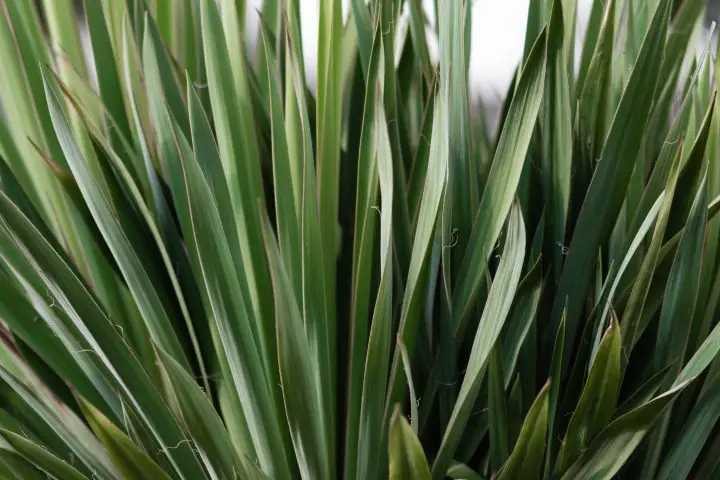Quando il tuo cane sviluppa l'artrite dalla vecchiaia, potresti iniziare a cercare rimedi naturali e imbatterti nella yucca. Spesso considerata un'alternativa naturale ai farmaci steroidei, la yucca è vista come un integratore per cani. Allo stesso tempo, viene definito altamente tossico dall'ASPCA e dai veterinari. Quindi i cani possono mangiare la yucca o no? Dovresti preoccuparti se il tuo cane prende un boccone di patatine yucca dal tuo piatto?
Ci sono una serie di cose da considerare quando si tratta di dare una yucca al cane, quindi cominciamo.

Cos'è la Yucca?
Yucca è visto in tutte le regioni aride e aride del mondo. Puoi trovare porzioni di yucca nei deserti messicani e in tutto il sud-ovest degli Stati Uniti. Nel corso della storia, la yucca è stata considerata una prelibatezza commestibile da molti popoli, oltre che una medicina.
Per gli esseri umani, la radice di yucca ha molti vantaggi, comprese le vitamine A, C e B, nonché potassio, zinco, ferro, magnesio, rame e selenio. La radice di yucca in polvere viene anche utilizzata negli integratori per la salute e aggiunta al tè. Alcuni cosmetici contengono yucca per chiarire le condizioni della pelle, poiché la yucca contiene anche proprietà antinfiammatorie.
Tuttavia, i cani e altri animali non possono ottenere gli stessi benefici delle persone. Perché? Perché la yucca è tossica anche per i cani a dosi più elevate. Fortunatamente, la yucca è abbastanza amara da impedire ai cani di mangiarla; ma ci sono casi in cui un cane potrebbe masticare una pianta.
Diversi tipi di piante di Yucca
Ci sono molti tipi di yucca, ognuno dei quali fa parte del Famiglia delle Asparagacee. Ogni tipo di yucca è tossico per cani, gatti e animali da pascolo anche più grandi, come i cavalli.
Le specie di yucca includono:
- Yucca alla banana (Yucca baccata)
- Yucca di Buckley (Yucca costrittiva)
- Baionetta spagnola (Yucca aloifolia)
- Ago di Adamo (Yucca filamentosa)
- Candela di Nostro Signore (Yucca Whipplei)
- Yucca saponaria (Yucca glauca)
- Yucca Beargrass (Yucca piccola)
- Yucca dal becco (Yucca rostrata)
- Yucca Mojave (Yucca shidigera)
- Pugnale spagnolo (Yucca gloriosa)
- e tanti altri
Mentre molti tipi di yucca vengono coltivati all'aperto per ornamenti nel cortile, puoi anche coltivare diverse varietà all'interno. Yucca in crescita al chiuso è più facile di quanto si possa pensare; e potresti pensare che sia una grande idea finché non ti ricordi di avere cani e gatti.
I cani possono mangiare la Yucca?
No, i cani non possono mangiare la radice di yucca. IL ASPCA elenca la yucca come tossica sostanza per cani, gatti, cavalli e altri animali da pascolo. Altre fonti ti diranno che la yucca va bene per cani e gatti come supplemento, ma a volte dimenticano di dirlo devono essere trasformati commercialmente primo. La yucca cruda, compresi i frutti, i fiori, i gambi, le foglie e le radici, è tossica per gli animali.
Perché la yucca cruda fa male ai cani? La yucca contiene un composto chiamato saponina steroidea, che provoca reazioni avverse in cani e gatti. Se un cane ingerisce una piccola quantità di yucca cruda, inizierà presto a vomitare e avrà una grave diarrea.
La yucca cruda contiene anche tracce di cianuro. Le quantità di cianuro hanno scarso effetto sull'uomo. Per i nostri piccoli compagni, però, i livelli di cianuro sono velenosi. Mangiare troppa yucca potrebbe essere letale; e nonostante il sapore amaro, i cani lo proveranno comunque.
I cani possono mangiare la yucca cotta?
Alcune persone dicono che cucinare la radice di yucca diminuisce la tossicità per gli animali. Questo non è vero. Hanno solo eliminato il cianuro, ma rimangono le saponine steroidee. La yucca, cruda o cotta, non è sicura per i cani. Non importa come servi un piatto di yucca, ci sono ancora composti dannosi in esso.
L'unica eccezione è quando si utilizza un raffinato integratore di yucca.
Quanto è cattiva la yucca per i cani?
Ti starai chiedendo quanto possa essere grave l'avvelenamento da yucca per i cani. Sappi solo che può andare molto male. Le saponine steroidee nella yucca irritano l'intestino e il sistema nervoso centrale. Quando viene mangiata una quantità sufficientemente grande, l'avvelenamento da yucca può essere fatale. Là è qualche buona notizia, però. Poiché la yucca ha un sapore disgustoso per i cani e provoca una reazione immediata, di solito non mangiano abbastanza yucca cruda perché sia letale.
Il breve video qui sotto delinea l'avvelenamento da yucca e i metodi di prevenzione:
Segni di avvelenamento da Yucca nei cani
Se il tuo amico a quattro zampe ha mangiato la yucca, potresti notare i seguenti sintomi:
- Dolore addominale
- Perdita di appetito
- Diarrea
- Pupille dilatate
- Depressione
- Gonfiore
- Aumento della frequenza cardiaca
- Sbavature eccessive
- Irritazione allo stomaco
- Debolezza muscolare
- Perdita di coordinazione e controllo muscolare
- Vomito
- Difficoltà a camminare
- Malattia del fegato
- Fotosensibilità
Se noti uno di questi segni nel tuo cane o li hai visti mangiare yucca, non aspettare. Chiama immediatamente un veterinario o il Linea di assistenza veleni per animali domestici per assistenza. Se possibile, prova a capire che tipo di pianta di yucca ha mangiato il tuo cane, in quanto ciò potrebbe aiutare con la diagnosi e il trattamento.
Diagnosi e trattamento dell'avvelenamento da Yucca nei cani
Una volta che il tuo cane ha preso un morso di yucca, non c'è tempo da perdere. Hai 18 ore prima che il tuo cane sviluppi sintomi renali. Chiama il veterinario, sali in macchina con il tuo amico peloso e fai un esame fisico. Il veterinario eseguirà un esame completo, controllando la frequenza cardiaca e respiratoria del cane, i riflessi e i livelli di ossigeno. Discuti di qualsiasi comportamento insolito che potresti aver notato, poiché questo aiuta solo con la diagnosi.
Possono essere richiesti anche esami di laboratorio. Questi spesso includono analisi delle urine, emocromo completo (CBC), elettroliti, glucosio e test dell'azoto ureico nel sangue (BUN). Se il tuo cane vomita spesso, può anche eseguire un test del volume cellulare (PCV). Potrebbero essere necessari altri test e procedure, come l'endoscopia, soprattutto se qualche yucca viene catturata nella gola del tuo cane.
Una volta che il veterinario ha formulato una diagnosi, inizia il trattamento. Il vomito può essere indotto con carbone attivo o perossido di idrogeno. Per stanare le tossine, il tuo cane può essere messo in IV. Lo svuotamento dello stomaco richiede generalmente una lavanda gastrica.
Una volta fatto tutto questo, il tuo cane dovrebbe riprendersi senza problemi.

Quando è buona la yucca per i cani?
A piccole dosi la yucca ha alcuni benefici. Anche se sembra contraddittorio, una piccola porzione di yucca può alleviare problemi digestivi, artrite e condizioni della pelle che colpiscono il tuo cane. Poniamo l'accento sulla "piccola porzione".
Alcuni produttori di alimenti per cani aggiungono persino yucca per ridurre l'odore degli escrementi. Se la cacca del tuo cane è atroce, puoi comprare cibo con yucca per attenuare un po' i fumi.
Ma perché questi integratori di yucca vanno bene? I cani possono mangiare la yucca o no?
La yucca cruda o la yucca cotta non sono mai sicure. La yucca è sicura solo quando è stata prodotta, raffinata e diluita commercialmente. Le capsule medicinali di yucca hanno quindi benefici per il tuo cane. Altrimenti evitalo del tutto.
Per sicurezza, potresti voler evitare qualsiasi cosa contenga yucca. Se non sei sicuro, parla con il tuo veterinario degli integratori di yucca e guarda cosa dicono.
Il lato schifoso di Yucca
I cani possono mangiare la yucca? Gli esseri umani adorano la yucca e tutti i suoi presunti benefici per la salute. Sfortunatamente, lo stesso non si può dire per i nostri amici canini. Mentre gli integratori di yucca possono aiutare il tuo cane con dolori articolari, problemi digestivi e condizioni della pelle, la yucca cruda e cotta è 100% non sicura. Anche a piccole dosi, la yucca cruda può causare vomito e diarrea. Dosi più elevate possono portare alla morte. Pertanto, se hai la yucca in giardino, potresti voler trasferire quelle piante altrove e tenere al sicuro il tuo amico peloso.
FAQ
L'ingestione di piante di yucca può essere dannosa per i cani, poiché le piante di yucca contengono composti chiamati saponine che possono essere tossici. La gravità della tossicità può variare a seconda della specie di yucca, della quantità ingerita e delle dimensioni del cane.
Se stai pensando di utilizzare la yucca come integratore o ingrediente nella dieta del tuo cane, è importante consultare un veterinario prima di farlo. Sebbene alcuni integratori di yucca siano commercializzati per determinati benefici per la salute, è fondamentale garantire che qualsiasi integratore sia sicuro e appropriato per le esigenze specifiche del tuo cane sotto la guida di un veterinario.




